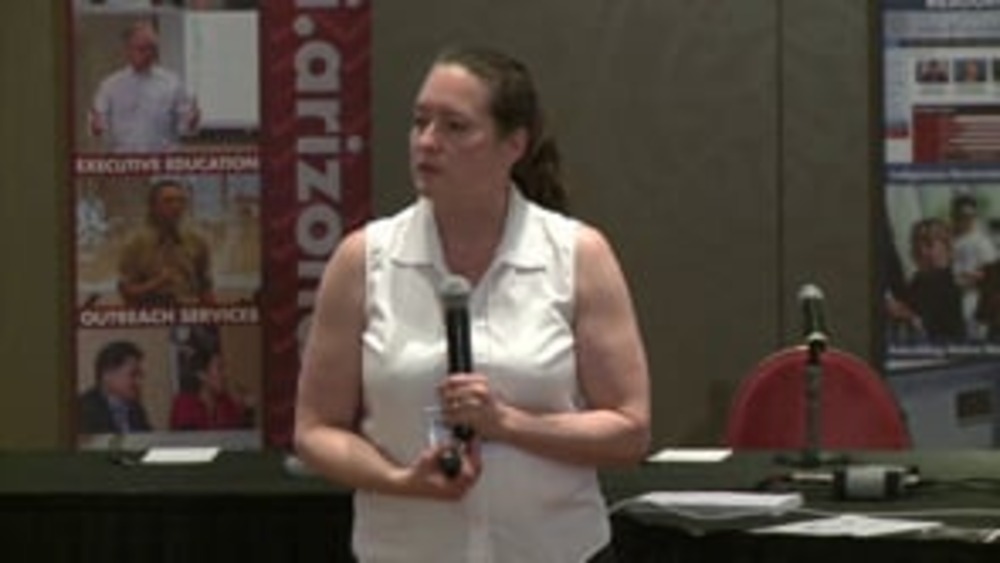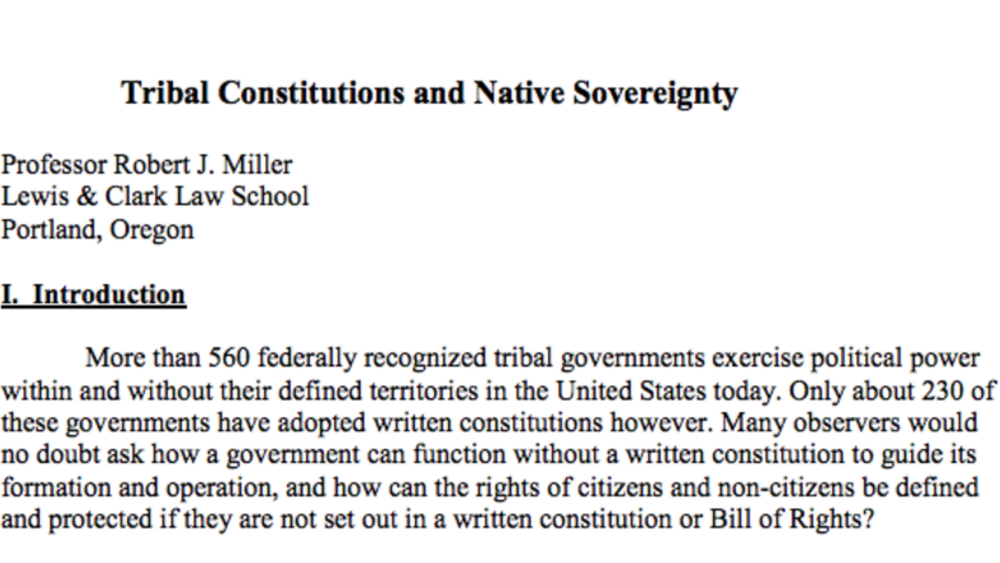In this highlight from the presentation "Key Things a Constitution Should Address: 'How Do We Make Law?'," Miriam Jorgensen lays out some of the different ways that Native nations can provide mechanisms for citizens of those nations to make laws or change laws governing those nations.
Additional Information
Jorgensen, Miriam. "Considering People-Made Law in Your Constitution (Presentation Highlight)." Tribal Constitutions seminar. Native Nations Institute for Leadership, Management and Policy, University of Arizona. Tucson, Arizona. April 2, 2014. Presentation highlight.
Transcript
"So what if a representative council isn't the only place you want that law made? Here critically I'm going to point out that there might be lots of decisions that you decide are perfectly appropriate to depute to a legislative council, to a representative council of some sort. But there may be certain kinds of decisions that you don't want to give over to them, that as a community, as a people you think there are certain kinds of decisions that you want to have broader agreement on and that's where a general council decision or a decision of the entire body of the nation, of all the voting age citizens or whatever, might be something that you want to make a provision for in your constitution.
I will say this one caveat, which is the first point above there. If general councils are the only way you're making law, that every time you want to make a new decision and you take it to the entire voting public, most research evidence proves...suggests...I shouldn't say proves because all that research do is sort of say, "˜Here's the general trend that we see out there.' Most research suggests that if you take most decisions to a general council, all decisions to the general council, that's a recipe for instability. There's just in a sense too much authority given over to kind of who showed up in the high school gym on any given night. But very successful Indigenous constitutions or other kinds of non-Indigenous constitutions too do have certain kinds of decisions that they say, "˜Yeah, this needs to go to a wider public.'
Now for a lot of native nations, one of the decisions that almost always goes to a broader public are decisions about land. So when you look across Native nation constitutions, Indigenous constitutions, and you see, okay, here's the powers of the tribal council or whatever the representative legislative body is, the congress, again, a council or a legislature, whatever it's going to be termed, there's still almost always when there are decisions to be made about purchasing land, selling land, changing the use of land, those go to a broader body, to a general council of some sort. So that's one way.
Another newer kind of provision we see in some of the very modern tribal constitutions might be called referendum or initiative and these are not quite the same as a general council meeting, but it comes from sort of the, I guess, the progressive and reform movement where basically even in non-Indigenous nations people said, "˜Well, individuals should have a voice. Individuals should be able to challenge their governments not just at election time but should be able to challenge and say, 'Hey, my representatives on the council didn't carry forth a piece of legislation that I would have liked to have seen'.' And initiative and referendum provide an opportunity for people to get enough signatures and then push a piece of legislation forward themselves as a population. So some constitutions provide for that kind of effort as well. And I've provided some examples in the handout first of limited general council power.
So here from the Coquille Indian Nation, where they've given the opportunity to the general council to make certain kinds of decisions, they're going to elect the tribal council, they can amend the constitution and they can make advisory recommendations. There isn't a listing here about land but again that shows you providing a general council with some limited legislative authority."
Here's an example from Skokomish [Tribal Nation], where they have an initiative provision and I love this initiative provision because it basically says, "˜Yeah, yeah, we know that people may still want to come forward and make law and not just have the council do all of that for us,' but look at this, they say, "˜An initiative can't just be a way to destabilize government. You can't just use an initiative to go out there and say, 'Oh, hey, that council, they didn't do what I wanted. There, I'm just going to bring an initiative forward and make law without them'.' Skokomish says, "˜I recognize that I want people to be or we was a nation recognize we want people to be able to make law and to put it out there, but they need to have 60 percent of the number of people who cast ballots in the last election sign a petition for this initiative and then it has to pass by two-thirds of all persons who voted in that election.' So it's a pretty high bar, right? It says, "˜This is going to...you can pass people-made law, but it has to meet a pretty high standard before it...otherwise it's going to be too de-stabilizing to government.'
Just a little aside, a lot of political scientists...I do economics and political science is my sort of academic degrees...a lot of political scientists look at California and say, "˜California doesn't do this well enough.' What do we know about California? Constantly they're having these referenda and initiatives and a lot of people said that California has too low of a bar, it allows too much of that disruption of the day to day flow of political business to go on by setting the bar too low. So it's too easy in a sense for the populace to kind of disrupt the government business by forcing these things forward.
So as a tribal nation with an even smaller population, I think it's really important to consider, yeah, it might be nice to have people-made law and to have provisions for that in your constitution, but really take seriously this notion of which kinds of things are you going to depute to a representative council, which kinds of things are you going to depute to a regularly convened general council and which opportunities do you really want to give to initiative and referendum. So that's a set of allocational decisions you need to be making in your constitution."



